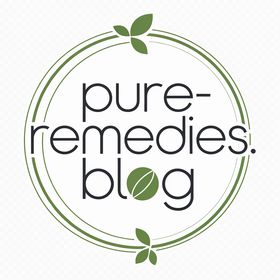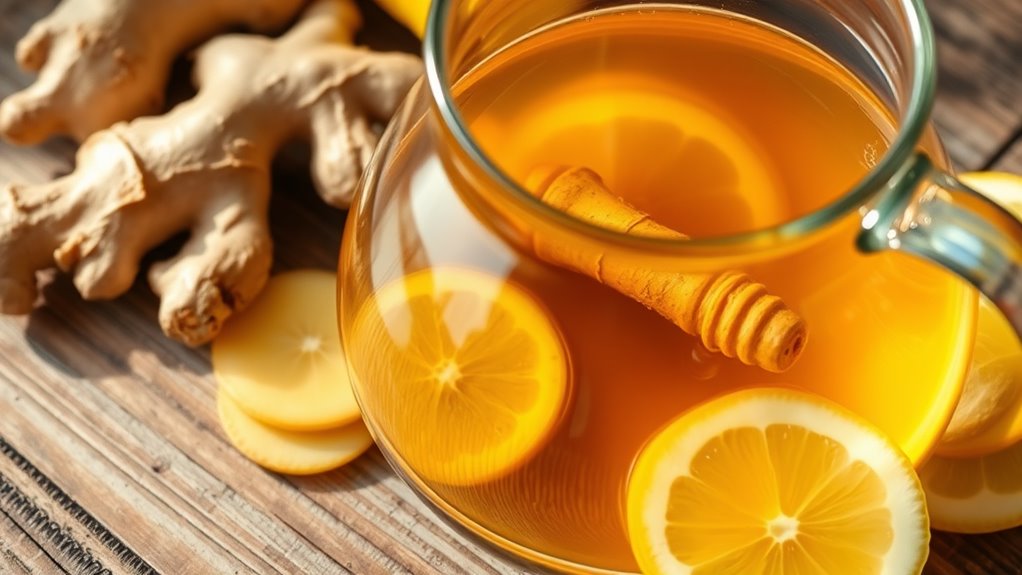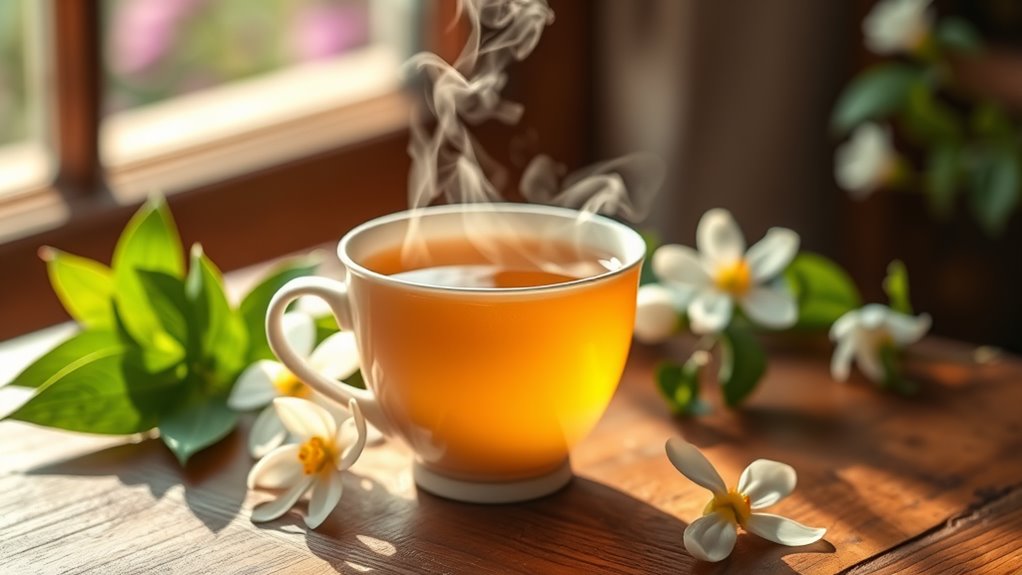Make This Anti-Inflammatory Tea in 5 Minutes or Less!
You’ll make this anti-inflammatory tea in under 5 minutes. Boil 2 cups of water, add 1 teaspoon of turmeric, a slice of ginger, and a dash of cinnamon. Stir well, simmer for 3-5 minutes, then strain into your mug for a soothing brew. It’s backed by research on curcumin’s inflammation-fighting effects, offering quick relief. Check out the full details on ingredients, benefits, and variations waiting below.
Key Takeaways
- Boil 2 cups of water in a pot or kettle to start the process quickly.
- Stir in 1 teaspoon of ground turmeric immediately after boiling to avoid clumping.
- Add a 1-inch piece of grated ginger and simmer for just 3-5 minutes.
- Strain the mixture through a fine mesh sieve into a mug for a smooth finish.
- Serve and sip the tea right away to enjoy its anti-inflammatory benefits in under 5 minutes.
Ingredients Required
To brew an effective anti-inflammatory tea, you’ll need simple, research-backed ingredients like turmeric, ginger, and cinnamon, which studies show can help reduce inflammation naturally. By harnessing nature, these herbs offer a foundation for natural healing as outlined in comprehensive guides.
Turmeric’s curcumin, backed by clinical trials, targets inflammatory enzymes, making it a potent choice for daily wellness. Ginger, rich in gingerol, has demonstrated in studies its ability to ease joint pain and oxidative stress.
Cinnamon, with its antioxidants, helps combat chronic inflammation, as evidenced by research on metabolic health. For a well-rounded anti-inflammatory tea, consider adding black pepper to enhance turmeric’s absorption, or honey for a touch of sweetness without overpowering benefits.
These ingredients work synergistically, drawing from evidence-based sources to support your body’s natural defenses against inflammation. Always opt for fresh, high-quality options to maximize efficacy. Additionally, this tea harnesses turmeric’s immune-boosting effects to promote overall health and wellness.
Step-by-Step Instructions
Follow these simple steps to brew your anti-inflammatory tea effectively.
Begin by boiling 2 cups of water in a kettle or saucepan; this ensures rapid, even heating for efficient extraction.
Add 1 teaspoon of ground turmeric and stir immediately to avoid clumping, allowing its curcumin to disperse.
Next, include a 1-inch piece of fresh ginger, grated or sliced, to release potent anti-inflammatory compounds quickly.
Reduce heat and simmer for 3-5 minutes, as studies indicate this optimizes the release of beneficial oils without overcooking.
Stir in a pinch of black pepper to enhance absorption, based on evidence from bioavailability research. This anti-inflammatory tea also supports the removal of toxic heavy metals from the body through its natural ingredients.
Turn off the heat, cover the pot briefly for an extra 30 seconds to intensify flavors, then strain through a fine mesh sieve into your mug for a smooth, ready-to-sip brew.
For added liver health benefits, consider incorporating beetroot into your daily routine as a natural superfood.
Benefits of the Tea
While inflammation is a common bodily response, this tea actively counters it with key ingredients like turmeric’s curcumin and ginger’s gingerols, which studies show can lower inflammatory markers and ease discomfort, making it a practical daily addition for better health. You’ll notice it reduces chronic pain, as research links curcumin to decreased cytokine levels, while gingerols combat oxidative stress. This blend supports your immune function and aids digestion, backed by clinical trials showing anti-inflammatory effects in just weeks, and for those seeking additional relief from skin issues, pairing it with coconut oil‘s anti-inflammatory properties could enhance overall benefits. It’s an easy way to enhance your daily routine without hassle.
Additionally, combining this tea with 4-7-8 breathing could amplify its stress-reducing benefits for overall well-being.
| Ingredient | Benefit | Evidence/Source |
|---|---|---|
| Turmeric (Curcumin) | Lowers inflammatory markers | Journal of Medicinal Food study |
| Ginger (Gingerols) | Eases joint discomfort | Cochrane Review on ginger |
| Honey | Soothes throat and boosts immunity | Antimicrobial properties research |
| Lemon | Enhances antioxidant activity | Phytotherapy Research findings |
| Cinnamon | Improves blood sugar control | Diabetes Care journal evidence |
Variations to Try
After enjoying the benefits of this anti-inflammatory tea, you’ll find variations help customize it to your taste while preserving its core effects.
For instance, if you want a spicier kick, swap ginger with a teaspoon of cayenne pepper, which research shows can enhance circulation and reduce inflammation through capsaicin’s properties.
You might also add fresh mint leaves for a cooling twist; studies indicate mint aids digestion and complements turmeric’s curcumin without altering its anti-inflammatory potency.
To boost antioxidants, incorporate a slice of fresh turmeric root instead of powder—it’s equally effective and offers a more robust flavor.
Experiment with a dash of black pepper to increase curcumin absorption, as evidenced by clinical trials.
Always use organic ingredients to maintain purity, ensuring your tweaks remain practical and health-focused.
These simple changes let you adapt the tea effortlessly.
For additional pain management benefits, consider blending in essential oils that complement the tea’s anti-inflammatory effects.
To further enhance energy levels, consider adding adaptogens like ashwagandha for combating daily fatigue.
Serving Suggestions
Once you’ve prepared your anti-inflammatory tea, you’ll want to serve it in ways that enhance its benefits and fit your routine. For example, drink it hot to maximize absorption of anti-inflammatory compounds like curcumin, or chilled for a cooling effect that aids hydration. This approach aligns with evidence from studies showing that temperature influences bioavailability, and incorporating this tea may help support immune health during minor illnesses.
To guide you, here’s a practical breakdown:
| Serving Style | Ideal Time | Key Benefit |
|---|---|---|
| Hot | Morning | Enhances metabolism and reduces morning inflammation |
| Iced | Afternoon | Provides refreshment and sustains energy levels |
| Room Temperature | Evening | Supports digestion and promotes restful sleep |
Experiment with these methods to optimize your tea’s anti-inflammatory potential, based on your daily schedule and preferences. Moreover, starting your day with hot tea can promote morning hydration, which helps combat brain fog for improved mental clarity. Always consult a healthcare provider for personalized advice.





